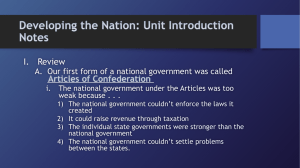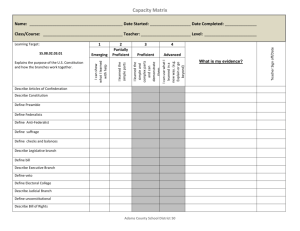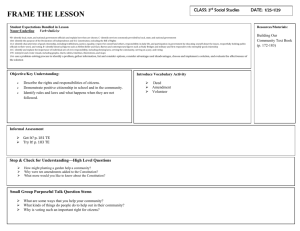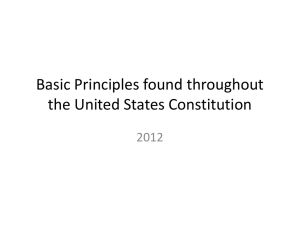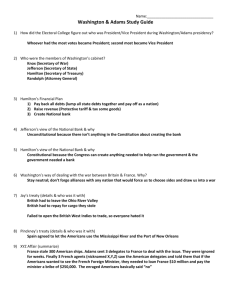The Founders on Civic Engagement
advertisement
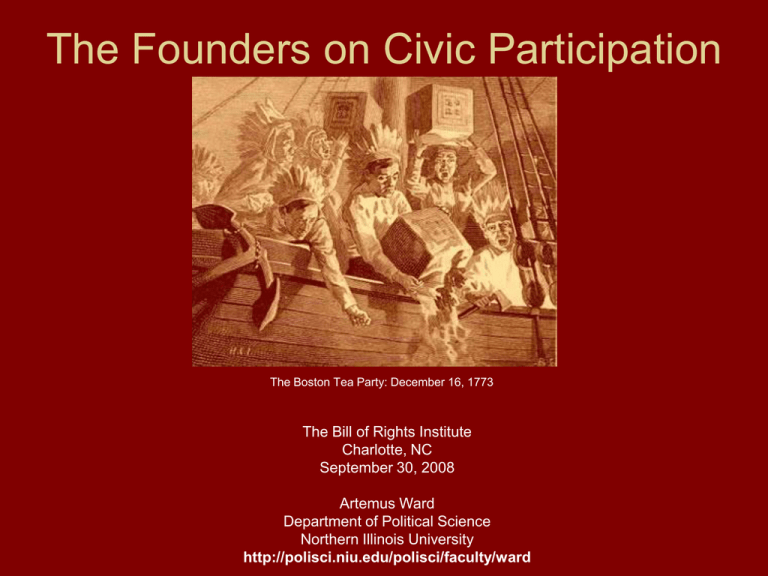
The Founders on Civic Participation The Boston Tea Party: December 16, 1773 The Bill of Rights Institute Charlotte, NC September 30, 2008 Artemus Ward Department of Political Science Northern Illinois University http://polisci.niu.edu/polisci/faculty/ward U.S. Constitution: Preamble • “We the People of the United States, in Order to form a more perfect Union, establish Justice, insure domestic Tranquility, provide for the common defence, promote the general Welfare, and secure the Blessings of Liberty to ourselves and our Posterity, do ordain and establish this Constitution for the United States of America.” • Does this sentence merely explain the meaning of the document or is there an ongoing, instructive component? Do the Framers Matter? George Washington was sworn in as the nation's first president on April 30, 1789, on the balcony of Federal Hall in New York. The mural depicts (from left to right) Robert R. Livingston, chancellor of the state of New York, administering the oath; Secretary of the Senate Samuel Otis holding the Bible; George Washington, with his hand upraised; and Vice President John Adams. • We will discuss how some members of the founding generation thought about civic participation. • What did they mean by education, voting, knowledge of current affairs, and public service? • Can we apply their ideals to American society today? John Adams on Education • “Wisdom and knowledge, as well as virtue, diffused generally among the body of the people being necessary for the preservation of their rights and liberties; and as these depend upon spreading the opportunities and advantages of education in various parts of the country, and among the different orders of the people, it shall be the duty of legislators and magistrates in all future periods of this commonwealth to cherish the interests of literature and the sciences.” – John Adams, The Constitution of the Commonwealth of Massachusetts, 1779 • What did Adams mean by “spreading the opportunities”? Alexander Hamilton on Voting • "A share in the sovereignty of the state, which is exercised by the citizens at large, in voting at elections is one of the most important rights of the subject, and in a republic ought to stand foremost in the estimation of the law." --Alexander Hamilton, 1784 editorial as Phocion • What did Hamilton mean by “a share in the sovereignty of the state”? Jefferson on Attention to Public Affairs • "Cherish, therefore, the spirit of our people, and keep alive their attention. If once they become inattentive to the public affairs, you and I, and Congress and Assemblies, judges and governors, shall all become wolves. It seems to be the law of our general nature." - Thomas Jefferson to Edward Carrington, January 16, 1787 • What are the consequences to an “inattentive” public? • How can the public’s “attention” to “public affairs” be cultivated? James Wilson on Public Service • "Need I infer, that it is the duty of every citizen to use his best and most unremitting endeavours for preserving it [the Constitution] pure, healthful, and vigorous? For the accomplishment of this great purpose, the exertions of no one citizen are unimportant. Let no one, therefore harbour, for a moment, the mean idea, that he is and can be of no value to his country: let the contrary manly impression animate his soul. Every one can, at many times, perform, to the state, useful services; and he, who steadily pursues the road of patriotism, has the most inviting prospect of being able, at some times, to perform eminent ones." – James Wilson, Independence Day speech, July 4, 1788 • What “useful services” should citizens undertake? James Madison on Knowledge • "Knowledge will forever govern ignorance; and a people who mean to be their own governors must arm themselves with the power which knowledge gives." -James Madison to W.T. Barry, August 4, 1822 • How can the “people” “arm themselves” with knowledge? Conclusion • The framers of the Constitution recognized that civic engagement was crucial for America. • Do the American people take seriously their responsibility for education, voting, knowledge of current affairs, and public service? • What can be done, either in the public or private sphere, to promote these responsibilities?


